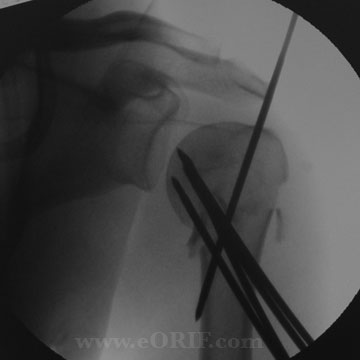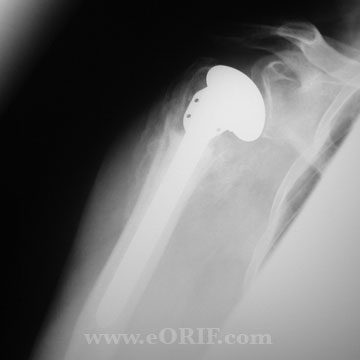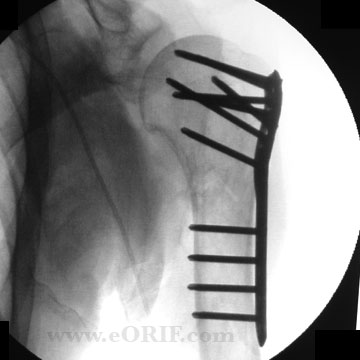|



|
Stable Proximal Humerus Fracture
- This protocol is for nondisplaced proximal humerus fractures, or patients stable fractures after surgical fixation.
Goal: Maintain range of motion (ROM) without displacing the proximal humerus fracture.
- Due to variable stability of the fracture, check for specifications and precautions ordered by the orthopedist.
Phase I (0 – 21 days)
- Begin elbow, wrist and hand active ROM.
- A sling and swath, or Velpeau with and axillary pad should be used when not doing physical therapy.
- Begin pendulum exercises (clockwise and counterclockwise).
- After 7 days, begin supine ER with a cane. Fifteen to 20 degrees of abduction are permitted if the patient is more comfortable.
- Establish a home exercise program so patient is performing exercises 3-5 times per day for 30 min. each session.
Phase II (3 - 6 weeks)
- Begin assisted forward elevation (FE).
- Perform pulley exercises and teach for home program.
- Perform isometric exercises for IR, ER, extension, and abduction.
Phase III (7 weeks – 2 months)
- Begin supine active FE.
- Progressively increase patient’s position from supine to erect during FE exercises.
- Use therabands of progressive strengths for IR, ER, flexion, abduction, and extension. Goal is progressive strengthening of deltoid and rotator cuff.
- Begin flexibility and stretching exercises to progressively increase ROM in all directions.
Unstable Proximal Humerus Fracture
- This protocol is for patients with unstable proximal humerus fractures.
Goal: Maintain ROM without displacing the proximal humerus fracture.
- Due to variable stability of the fracture, check for specifications and precautions ordered by the orthopedist.
Phase I (0 to 21 days)
- Begin elbow, wrist and hand active ROM.
- A sling and swath, or Velpeau with an axillary pad should be used when not doing physical therapy.
- After 14 days, begin pendulum exercises (clockwise and counterclockwise).
- Establish a home exercise program so patient is performing exercises 3-5 times per day for 10 minutes each session.
Phase II (3 to 6 weeks)
- Begin supine ER with a cane. Fifteen to 20 degrees of abduction are permitted if the patient is more comfortable.
- Begin active assisted forward elevation (FE).
- Perform pulley exercises and teach for home program.
- Perform isometric exercises for IR, ER, extension, and abduction.
Phase III (7 weeks to 2 months)
- Begin supine active FE. Progressively increase patients position from supine to erect during FE exercises.
- Use Therabands of progressive strengths for IR, ER, anterior, middle and posterior deltoid.
- Begin flexibility and stretching exercises to progressively increase ROM in all positions (i.e. towel behind back, finger walking up the wall, etc.).
|



